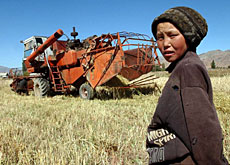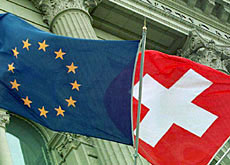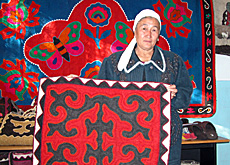EU fund threatens Swiss help to Eastern bloc

Switzerland’s funding of cooperation projects in Eastern Europe and the former Soviet Union is under threat despite generally good marks from independent experts.
Credits could be cut in favour of a contribution to the European Union’s fund for economically depressed member states.
Earlier this year, the Swiss government submitted a request to parliament for SFr800 million ($624 million) for projects in Eastern Europe over the 2005-2008 period.
But this month, as they attempted to conclude their latest round of bilateral accords with the EU, the Swiss offered SFr1 billion to the new member state fund.
Now agreement on the bilaterals has been reached, the government is facing a quandary. Financial restrictions mean the money it has promised to the EU must be found within the budgets of the foreign affairs and economics ministries.
Favourable report
The two ministries, which have been overseeing development aid and cooperation for the past 14 years in Eastern Europe and the former Soviet Union, are not overjoyed at the prospect of having to come up with the funds.
Meanwhile, an independent report has come out in support of their continuing work.
Commissioned by the Swiss Agency for Development and Cooperation (SDC) and the State Secretariat for Economic Affairs (Seco), the report stressed the need to pursue projects in the newly independent states in the southern Caucasus and Central Asia.
The ten experts behind the report agree that Swiss aid in Eastern Europe and the former Soviet republics has had beneficial effects, but also say that in future fewer projects should be funded in a smaller number of countries.
The Swiss have been providing aid to promote transition towards democracy and to strengthen economic and social development based on market-economy principles.
One of the stated aims of this aid is to ensure political stability. “This reduces the potential for conflict, migration movements and organised crime,” added Thomas Jenatsch of the SDC.
Good returns
Under federal law, Switzerland has an obligation to aid developing nations. Since 1990, over SFr3 billion has been invested in Eastern Europe, but according to Seco, it hasn’t been a one-way street.
“For every SFr1 invested, there has been a SFr1.50 return to the Swiss economy,” said Seco spokesman Christian Hofer.
Part of that return stems from the fact that a condition of the Swiss aid was that Swiss companies would get 50 per cent of all new infrastructure projects.
But Hofer says that business also reaped profits from the recognition Switzerland received for its cooperation projects. “Companies were able to gain access to markets thanks to our work,” he told swissinfo.
The planned credit of SFr800 million is already down by a third from the previous four-year period. And the threat of further cuts is causing concern.
“Nobody is happy about this situation,” said Erwin Jutzet, president of the House of Representatives foreign affairs commission.
“But it’s obvious the government has decided to spend the money elsewhere.”
Opposition
But Jutzet, a Social Democrat, warns that the EU may not receive the money it expects either.
“Members of the Right who are already opposed to the Schengen and Dublin agreements may question why we have to pay to join up,” he told swissinfo.
Non-governmental organisations are warning any reduction of funding will affect the poorest countries, adding that handing more money to new EU members is unnecessary.
Despite that, officials at the SDC and Seco are already prepared to change their policies.
“We will have to change our strategy, but we don’t want to talk about cuts,” said Hofer. “We will have to rethink our approach and probably concentrate on some projects in certain countries, as the independent report suggested.”
swissinfo, Scott Capper
Switzerland has spent over SFr3 billion in cooperation aid in Eastern Europe and the former Soviet Union in the past 14 years.
The Swiss government wants to contribute SFr1 billion to the EU’s fund for economically depressed member states over the next five years.
Each franc invested in cooperation aid in Eastern Europe and the former Soviet Union returns SFr1.50.
Switzerland’s aid to Eastern Europe and the former Soviet republics is aimed at strengthening the transition to democracy and a market-based economy, with over 800 projects.
Started in the early 1990s, the process has reached its end in the new member states of EU.
For the next four years, the SDC and Seco would like to concentrate on projects in the Balkans (70 per cent), the Southern Caucasus and and Central Asia.

In compliance with the JTI standards
More: SWI swissinfo.ch certified by the Journalism Trust Initiative













You can find an overview of ongoing debates with our journalists here . Please join us!
If you want to start a conversation about a topic raised in this article or want to report factual errors, email us at english@swissinfo.ch.